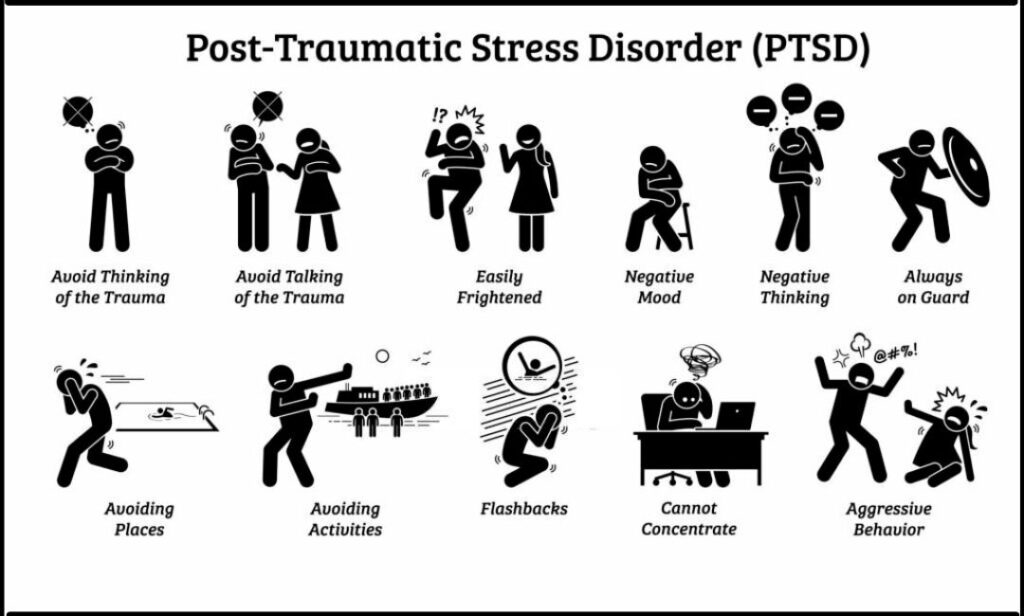PTSD (Post traumatic Stress Disorder) - Symptoms, Causes, Prevention & Homeopathic treatment

Overview
Post-Traumatic Stress Disorder (PTSD) is a mental health condition triggered by experiencing or witnessing a traumatic event. It can severely impact an individual’s emotional and psychological well-being, affecting daily functioning and quality of life. Traditional treatments often focus on psychotherapy and medication, but homeopathy offers a complementary approach that addresses the unique emotional and psychological needs of each individual.
Symptoms
PTSD presents with a variety of symptoms that can interfere with daily life and emotional stability. These symptoms are typically grouped into four categories:
1. Re-experiencing Symptoms
- Flashbacks: Reliving the traumatic event as if it is happening again.
- Nightmares: Disturbing dreams related to the trauma.
- Intrusive Thoughts: Unwanted and distressing thoughts about the event.
2. Avoidance Symptoms
- Avoiding Reminders: Steering clear of places, people, or activities that remind one of the trauma.
- Emotional Numbness: Feeling detached or disconnected from others.
3. Arousal Symptoms
- Hypervigilance: Being excessively alert or easily startled.
- Sleep Disturbances: Trouble falling asleep or staying asleep.
- Irritability: Increased anger or outbursts.
4. Negative Mood Symptoms
- Persistent Negative Feelings: Feelings of guilt, shame, or hopelessness.
- Difficulty in Relationships: Trouble forming or maintaining close relationships.
When to See a Doctor
Seek professional help if you experience:
- Persistent Symptoms: Symptoms that last more than a month or interfere with daily life.
- Severe Distress: Intense emotional pain or thoughts of self-harm or harming others.
- Difficulty Functioning: Struggles with work, relationships, or daily tasks.
- Re-experiencing Trauma: Flashbacks or nightmares that disrupt daily life.
- Avoidance: Significant avoidance of situations or places associated with the trauma.
Causes
PTSD develops in response to experiencing or witnessing traumatic events. These events may include:
- Violent Incidents: Assault, abuse, or combat.
- Accidents: Serious accidents or natural disasters.
- Loss: The death of a loved one or severe personal loss.
- Threats: Situations that cause extreme fear or helplessness.
Risk Factors
Several factors can increase the likelihood of developing PTSD:
- Previous Trauma: A history of trauma or abuse.
- Intensity of the Trauma: Severity and duration of the traumatic event.
- Genetics: Family history of mental health disorders.
- Lack of Support: Limited social support or isolation following the trauma.
- Pre-existing Mental Health Issues: Prior mental health conditions or substance abuse.
Complications
PTSD can lead to various complications, including:
- Depression and Anxiety: Increased risk of other mental health conditions.
- Substance Abuse: Higher likelihood of turning to drugs or alcohol for relief.
- Relationship Problems: Strain on personal and professional relationships.
- Physical Health Issues: Stress-related health problems such as cardiovascular issues.
- Impaired Functioning: Difficulty with work, daily activities, and overall quality of life.
Preventions
While PTSD cannot always be prevented, certain strategies can reduce the risk or mitigate the impact:
- Resilience Building: Developing coping strategies and emotional resilience.
- Early Intervention: Seeking help immediately after experiencing a traumatic event.
- Social Support: Building a strong support network of friends and family.
- Healthy Lifestyle: Maintaining physical health through exercise, nutrition, and sleep.
- Stress Management: Practicing relaxation techniques and stress-reduction strategies.
Can Homeopathy Help?
Homeopathy can offer a supportive approach for managing PTSD by addressing the unique symptoms and emotional needs of each individual. Homeopathic remedies are selected based on a detailed assessment of the patient’s physical, emotional, and psychological state. Some commonly used remedies include:
- Arsenicum Album: For anxiety, restlessness, and feelings of insecurity.
- Natrum Muriaticum: For unresolved grief, emotional suppression, and withdrawal.
- Ignatia Amara: For emotional shock, grief, and mood swings.
- Opium: For numbness, dissociation, and emotional shutdown.
- Aurantium: For feelings of despair and hopelessness.
A homeopathic practitioner will tailor remedies to the specific needs of each patient, considering their unique experiences and symptoms.
Diagnosis
Diagnosing PTSD involves a comprehensive evaluation by a mental health professional:
- Clinical Interview: Detailed discussion of symptoms, trauma history, and overall functioning.
- Diagnostic Criteria: Assessment based on criteria outlined in the Diagnostic and Statistical Manual of Mental Disorders (DSM-5).
- Self-Report Questionnaires: Tools to assess the severity and impact of symptoms, such as the PTSD Checklist (PCL).
Treatments
Treatment for PTSD often includes a combination of approaches:
- Psychotherapy: Cognitive Behavioral Therapy (CBT), Eye Movement Desensitization and Reprocessing (EMDR), and trauma-focused therapies.
- Medication: Antidepressants, anti-anxiety medications, and other psychotropic drugs.
- Homeopathy: Complementary approach to manage symptoms and support overall well-being.
- Support Groups: Participation in groups where individuals share experiences and coping strategies.
Lifestyle and Home Remedies
Incorporating lifestyle changes and home remedies can support overall health and complement treatment plans:
- Regular Exercise: Engaging in physical activity to reduce stress and improve mood.
- Healthy Diet: Consuming a balanced diet rich in nutrients to support overall health.
- Relaxation Techniques: Practicing mindfulness, meditation, or yoga to manage stress.
- Adequate Sleep: Maintaining a consistent sleep schedule and creating a restful environment.
- Journaling: Writing about experiences and feelings to process emotions.
- Social Support: Building and maintaining strong relationships and seeking support from friends and family.
Preparing for Your Appointment
To make the most of your appointment with a healthcare provider or homeopathic practitioner:
- Document Symptoms: Keep a detailed record of symptoms, including their frequency and impact on daily life.
- Trauma History: Provide information about the traumatic events experienced and their effects.
- Medical History: Share any relevant medical and mental health history.
- Questions and Concerns: Prepare a list of questions about diagnosis, treatment options, and management strategies.
- Support System: Consider bringing a trusted family member or friend to discuss the individual’s needs and support.
- Daily Impact: Describe how PTSD affects daily life, including work, relationships, and self-care.
